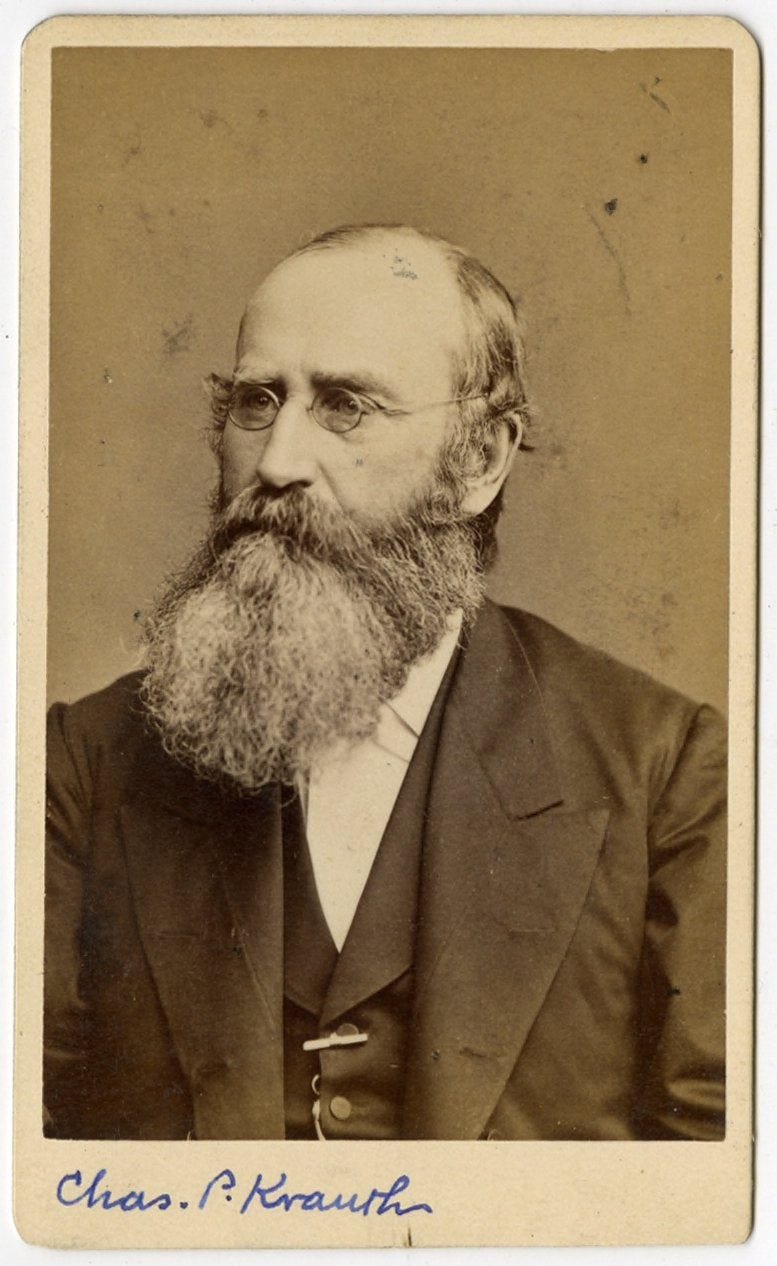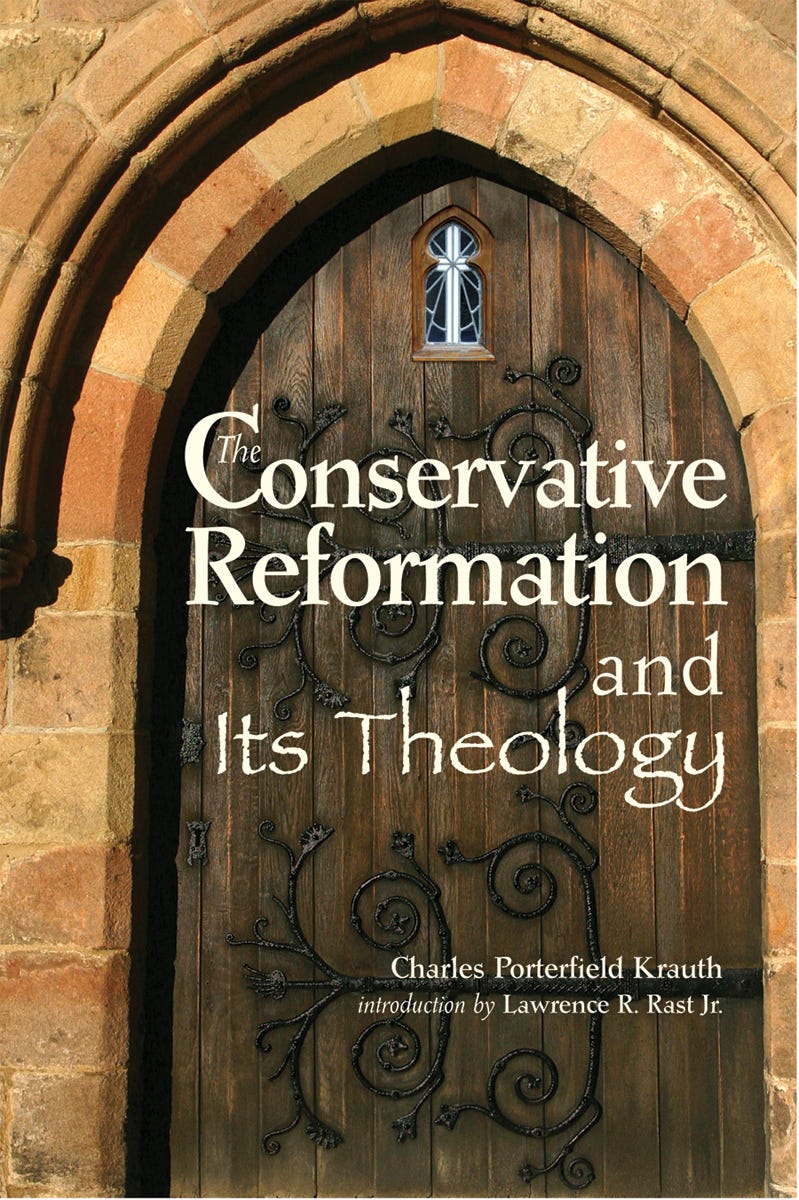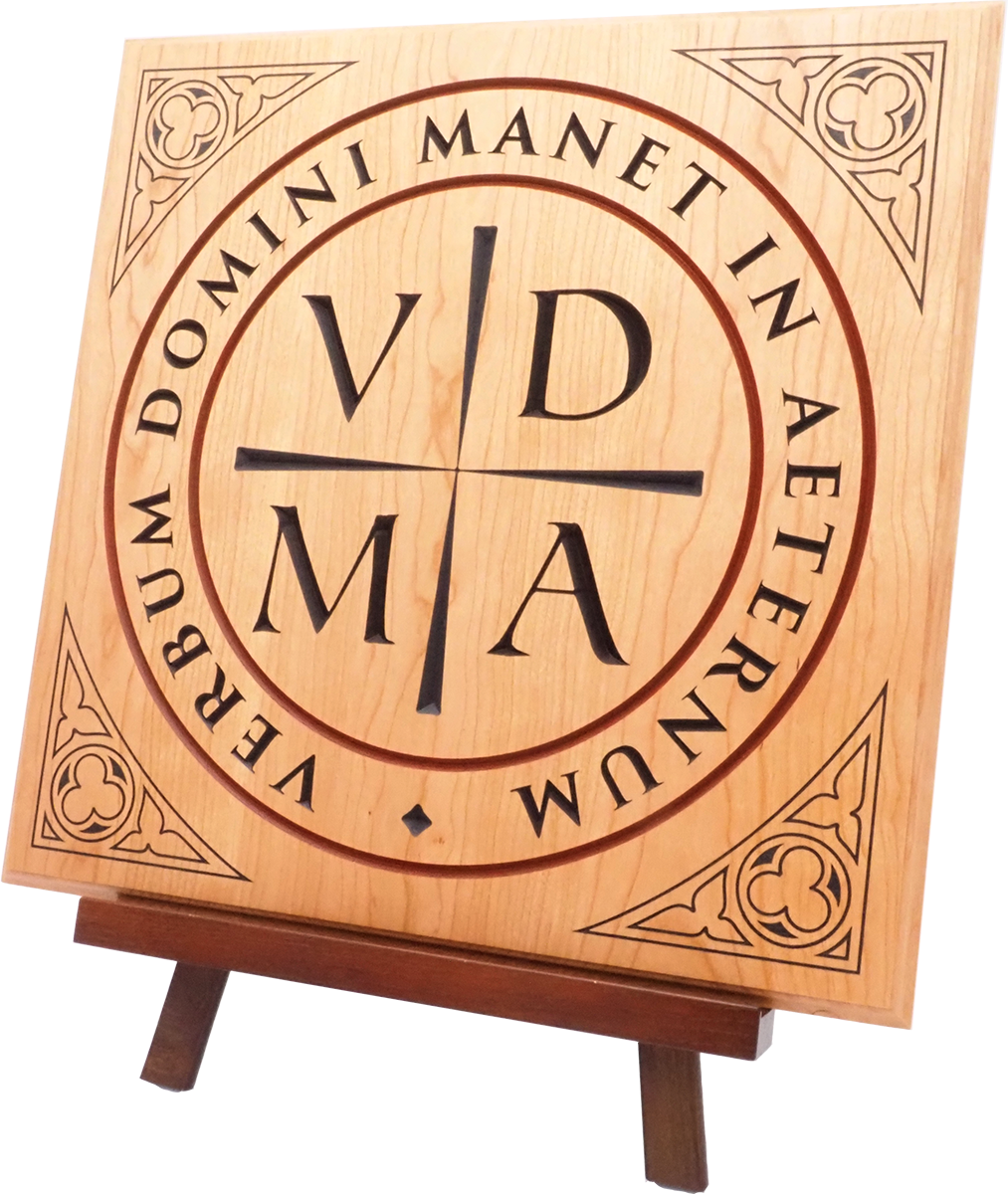Correcting Doctrinal Errors with True Christian Charity
"Charity does not cover error, because error is the daughter of sin, and charity is the daughter of God." Charles P. Krauth's prescient notes touch on SELK's ambiguous response to women's ordination.
Charles Porterfield Krauth (1823–1883) was a unique Anglo-American Lutheran pastor, theologian, and educator. He was most concerned with doctrinal indifference (theological apathy), especially the rationalistic and revivalistic influences affecting Lutherans during that period, along with the leavening ecumenism in the Lutheran churches. Krauth was firm that fidelity to the Lutheran Confessions could be upheld without compromise within American contexts and expressions.
Krauth’s The Conservative Reformation & Its Theology is the highest grade gold mine imaginable when it comes to gaining some insights into the malaise afflicting 21st-century American Lutheranism, which is in too many ways a repristination of the 19th-century malaise he confronted. Indeed, rationalism is very evident in the German “confessional” Lutherans’ slick political maneuvering around female ordination.
His polemics are as delightful as they are witty, pastoral, and incisive, and his English has a timeless clarity, grace, and elegance.
“We do not claim that our Confessors were infallible. We do not say they could not fail. We only claim that they did not fail.”
Nature and progress of doctrinal error
WHEN ERROR BECOMES HERESY: A doctrinal error turns into heresy when it is "held and defended obstinately as right"1. Heretics "refuse to be taught; they defend their error as right, and fight against known truth, and against their own consciences". However, no heresy exists that "did not also affirm some truth."2
CONSEQUENCES: Corruption in doctrine flourishes when it is not clearly stated. Ambiguous formulas do not promote unity but instead cause alienation and deep mistrust.3 Doctrinal indeterminateness can cause a church to become a "home of men of the most opposite opinions" and invites unwanted and dangerous innovation.4 A church that "contends for nothing, either has lost the truth, or has ceased to love it"5. Krauth describes error as "the daughter of sin" and, very interestingly, that it has "affinity with the spirit of persecution.”6
STAGES OF ERROR’S PROGRESS IN THE CHURCH: When error is allowed, it typically progresses through three stages7
Toleration: It starts by asking to be left alone, assuring most that it will not disturb the status quo.
Equal Rights: It then asserts that truth and error are balancing forces, and that deciding between them is a “sin of partiality”. It claims "bigotry to assert any superior right for the truth" and deems anything on which they differ as non-essential.
Supremacy: Finally, error claims preference for its own judgments, placing individuals in positions because they repudiate the Church's faith and even encouraging them to oppose it.
…the danger of apostasy is connected, not with fidelity to the Confession, but with want of fidelity.
Sources and causes of doctrinal error
Human Fallibility: A habit of "agreeing to differ" through ambiguous formulas is the most obvious product of our fallibility. It does not foster unity but instead causes "wider alienation and bitter mistrust". This intellectual or interpretive error easily corrupts the clear meanings of Scripture, making the Confession and the Word appear contradictory, a characteristic of Rationalism, which is considered "Infidelity in the bud."8
Personal Weaknesses and a Lack of Attention: As a "great organization," the Church's systems are susceptible to modification by the "wilfulness of some, the feeble-mindedness of others, [and] the power of surrounding influences.”9
Ambiguity and Vacillation: Melanchthon's "vacillations" and "skilful phrases and skilful concealments" led to ambiguity that exacerbated controversies, as they "practically operated as if the worse sense were the real one".10
Crypto-Calvinism: The deceptive practice where individuals, while professing one faith, secretly promote or disregard doctrines of another belief system.11
Rationalism: This movement is marked by its attempt to elevate human reason over divine authority. It "pretend[s] to hold the Word, but to corrupt its sense", allowing individuals to reject core doctrines while still claiming to be Lutheran.12 It also fosters the dangerous idea that "error is practically as good as truth, if a man heartily believes it to be the truth".13
Hard and Soft Antinomianism: It is characterized as a "Pelagianism of the Gospel".14 This phrasing is interesting because Pelagianism usually stresses human effort for salvation, while antinomianism minimizes the need for good works. However, Porterfield points out that antinomianism is the offspring of Pelagianism because it often gives a false sense of security, hence "Pelagianism of the Gospel," by implying that faith alone, without good works, is enough for salvation.
“Wherever the Law is despised, disparaged, and corrupted, the Gospel, too, cannot be kept intact. Whenever the Law is assailed, even if this be done in the name of the Gospel, the latter is, in reality, hit harder than the former. The cocoon of antinomianism always bursts into antigospelism.” Friedrich Bente.
Combating doctrinal error
The Word of God as the Sole Rule of Faith: This is so obvious it almost seems silly to mention, yet we have numerous examples, like the Valparaiso Theology, where the Bible is ignored or softened. Krauth is firm: all doctrines and teachers should be judged only by the writings of the prophets and apostles.
The Confessions as a Testimony and Standard: The Lutheran Confessions are not the rule of faith but "purely set forth that faith". They serve as an "explicit statement of faith", a "wall of adamant against Romanism", and a means to "clearly state her faith" to prevent misrepresentation.15
Clear and Unambiguous Language: The Lutheran Church aims for doctrines to be expressed in "but one sense" to prevent misunderstanding and confusion. Ambiguity is rejected as a way to attain or maintain unity.16
Logical Argumentation: Heresies are to be confronted "with the Scripture, not with fire".17 This requires calmly arguing the questions and refuting errors through theological scholarship and reasoned debate, not persecution. We will write in the future about Missouri and the AALC’s hostile tendency to mock and disdain other denominations while our own houses are in terrible condition.
Church Discipline: The Church has the right and duty to defend itself against the abuse of private judgment by "setting forth the truth in her Confession, by faithfully controverting heresy, by personal warning to those that err, and, finally, with the contumacious, by rejecting them from her communion". 18 However, this rejection is not persecution or disagreeableness.
Pastors and Teachers of the Church: Ministers are responsible for "admonish[ing], and teach[ing] out of God’s Word with moderation those who err from the truth through simplicity or ignorance". They must be "apt to teach," confronting "unruly and vain talkers and deceivers".19 Pastors are expected to show "incorruptness in doctrine", which aligns with the Church's overall commitment to "uncompromising maintenance of sound government" and doctrine.”20
No Compromise on Truth: True compromise "can only sacrifice preferences to secure principles,"21 not the other way around. The Church is committed to "unswerving fidelity to what she is persuaded is the truth of God". The instruction for us is never to forget that "the true and the good must be secured at any price. They are beyond all price. We dare not compute their cost."22 When the Lutheran Church lays her hand on the Bible, she gives the command, 'Believe!' and when she lays it on the confession, she asks, 'Do you believe?'. If a person replies "No" to the latter, she considers them as having not obeyed the command, believing "most firmly that she has the truth"23
“There is not an article in our creed that is not an offence to somebody; there is scarcely an article that is not a stumbling block to some who still profess to be Christians. It is impossible to find a place to stop, when the concessions once begin. And the reason is manifest; the principle is wrong, and displaces a principle that is right. The one is human, the other is divine; the human opinion and sentiment is substituted as a rule and guide for the Word of God and the faith that accepts it as absolute authority.” – Matthias Loy, The Story of My Life.
Krauth reminds us that compromising churches and appeasing church politicians are not new. Simply put, the gates of hell do prevail against the church militant when doctrinal fidelity is seen as too difficult to uphold and too divisive to manage. Yet, Christians, especially pastors, are called to confront error with scriptural accuracy, confessional clarity, and pastoral grace—rather than coercion, indifference, or compromise. Krauth demonstrates a path toward genuine unity, where the Church protects its foundation without losing charity toward those who are mistaken in sincere ignorance. For those who are mistaken in opposition to Scripture, they must be confronted as if the lives of your children are at risk.
As American Lutheranism grapples with echoes of 19th-century maladies and other ancient ones, from diluted confessions to innovative practices that erode core truths, Krauth's wisdom urges us: "The danger of apostasy is connected, not with fidelity to the Confession, but with want of fidelity." A church that loves the truth of pure doctrine will fight for it. A church that is indifferent to, or despises it, will not.
Our Church confesses “that among those who are upon the true foundation there are many weak ones, who build upon the foundation perishing stubble, that is, empty human notions and opinions, and yet because they do not overthrow the foundation, are still Christians, and their faults may be forgiven them, or even be emended.” “An error,” says Luther, ‘‘ however great it may be, neither can be called heresy, nor is heresy, unless it be held and defended obstinately as right.” Erring makes no heretics; but the defending and protecting error with stiffness of neck, does.”
Charles Porterfield Krauth, The Conservative Reformation and Its Theology (Philadelphia: J. B. Lippincott & Co., 1871 and 1899), 142. The PDF version used for this article is available from LutheranLibrary.org (thank you for your labor for Christ’s Kingdom).
‘‘There never has been a heresy which did not also affirm some truth. Wherefore we must not deny the truth (it contains) on account of the falsehood (it mixes with it). “Heretics not merely err, but refuse to be taught; they defend their error as right, and fight against known truth, and against their own conscience and consciously they remain in their error.” Ibid. 142-143.
Ibid., 290.
“The Church of England has two great elements; but they are not perfectly preserved in their distinctive character, but, to some extent, are confounded in the union. With more uniformity than any other great Protestant body, it has less unity than any. Partly in virtue of its doctrinal indeterminateness, it has been the home of men of the most opposite opinions: no Calvinism is intenser, no Arminianism lower, than the Calvinism and Arminianism which have been found in the Church of England.” Ibid. x
“[The Lutheran Church] has contended for great truths at great sacrifices, and in every conflict in which it has borne a part, truth has ultimately been victorious. A Church which contends for nothing, either has lost the truth, or has ceased to love it. Warfare is painful, but they whose errors create the necessity for it are responsible for all its miseries.” Ibid., 147.
Ibid. 173.
Ibid. 195.
Ibid. 185-186.
“No great organization moves so absolutely along the line of a single tendency as to have nothing in it beyond that tendency, or contradictory to it. The wilfulness of some, the feeble-mindedness of others, the power of surrounding influences, modify all systems in their actual working.” Ibid. xii Krauth was early to the game on “The purpose of a system is what it does (POSIWID)”!
Ibid. 291.
Ibid. 296.
”The history of the Altered Confession demonstrates that not only is it no gain to the peace of the Church, but produces a yet more grievous disturbance of it, when the effort is made to harmonize men by an agreement in ambiguous phraseology, (exactly what SELK is guilty of with its handling of women’s ordination, and the LCMS is guilty of when it turns the other cheek to look far the other way) the adoption of terms which are to be accepted in one sense by one set of men, and in another sense by another.” Ibid. 248.
“This was the work of Rationalists—to pretend to hold the Word, but to corrupt its sense, so that the Confession and the Word should no longer seem to correspond. The mischief seemed to be incurable, but God did not forsake his own work. The evil brought its own cure. The mischief wrought until it was found that the idea of men calling themselves by the name of a Church, and yet claiming the right to assail its doctrines, was the idea of Infidelity in the bud — it was Belial allowed to take shelter under the hem of the garment of Christ.“ Ibid. 198.
“The wrong remedy will not cure morbus, however sincere the misguided physician may be in recommending it, and the deluded patient in using it. It is the dream of a Rationalism close upon Deism, that error is practically as good as truth, if a man heartily believes it to be the truth; that you can substitute arsenic for salt with safety, if you believe it to be salt. The kingdom of nature and of grace are both under law. Things will be done after God’s ordinance, or they will not be done at all.” Ibid. 396.
“…the Gospel presupposes the Law and is rendered meaningless without it. Wherever the Law is despised, disparaged, and corrupted, the Gospel, too, cannot be kept intact. Whenever the Law is assailed, even if this be done in the name of the Gospel, the latter is, in reality, hit harder than the former. The cocoon of antinomianism always bursts into antigospelism.” The Antinomistic Controversy, by Friedrich Bente.
“This, then, is a summary of the result we reach: The basis of the Evangelical Lutheran Church is the Word of God, as the perfect and absolute Rule of Faith, and because this is her basis, she rests of necessity on the faith of which that Word is the Rule, and therefore on the Confessions which purely set forth that faith. She has the right rule, she reaches the right results by the rule, and rightly confesses them. This Confession then is her immediate basis, her essential characteristic, with which she stands or falls.” Krauth, op. cit. 179.
Ibid. x
“How easy is it to err! Let us ward against them with the Scripture, not with fire.” Ibid. 143.
“The right of private judgment and the right of Church discipline are co-ordinate and harmonious rights, essential to the prevention, each of the abuse of the other. To uphold either intelligently, is to uphold both. In maintaining, therefore, as Protestants, the right and duty of men, in the exercise of private judgment, to form their own convictions, unfettered by civil penalties in the State, or by inquisitorial powers in the Church, we maintain, also, the right and duty of the Church to shield herself from corruption in doctrine by setting forth the truth in her Confession, by faithfully controverting heresy, by personal warning to those that err, and, finally, with the contumacious, by rejecting them from her communion, till, through grace, they are led to see and renounce the falsehood, for which they claimed the name of truth. The faith of the Church, drawn from the rule by the just exercise of private judgment, illumined by the Holy Ghost, has been tested and developed in three ways: First, by science; next, by history; and thirdly, in the practical life of the Church.” Ibid. 175-176.
“Yet, in the Preface to the book in which that Formula was embodied, the Electors, Princes, and Orders of the Princes of the Empire thus declare themselves: “It is by no means our will and intent, in the condemnation offalse and impious doctrines, to condemn those who err from simplicity, and who do not blaspheme the truth of God’s Word. Still less do we wish to condemn whole churches either within the bounds of the German Empire or beyond it, . . . for we entertain no doubt whatever (ganz und gar keinen zweifel machen) that many pious and good people are to be found in those churches also, which to this time have not thought in all respects with us ; persons who walk in the simplicity of their hearts, not clearly understanding the points involved,...and who, it is to be hoped, if they were rightly instructed in the doctrine, through the guidance of the Holy Spirit, into the unerring truth of God’s Word, would consent with us.... And on all the theologians and ministers of the Church is the duty specially incumbent to admonish, and teach out of God’s Word with moderation those who err from the truth through simplicity or ignorance, lest the blind leading the blind, both perish.” Ibid. 144-145
Ibid 178.
Ibid. xi
Ibid. 21.
“Believing most firmly that she has the truth, and that her testimony to this truth is set forth in her creeds, she is distinguished among Protestant churches by her fidelity to her Confession.” Ibid. 128.





It is important to note that Krauth was not LCMS but rather The General Council which was largely an east coast synod. He is representative of a Lutheran tradition in PA and the northeast as a whole that is now largely and unfortunately gone.
Great article. Thank you for sharing.